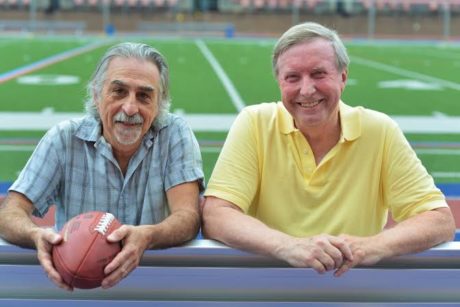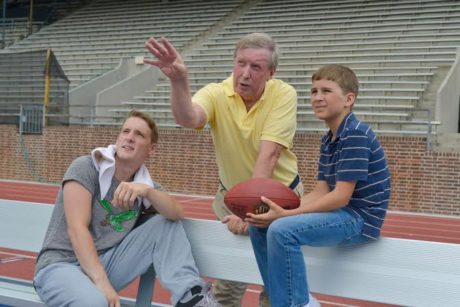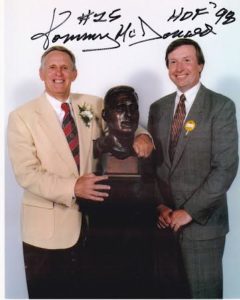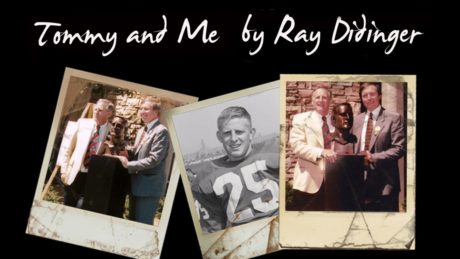When award-winning sportswriter and radio-show host Ray Didinger was a kid, he never could have imagined that he’d end up helping his boyhood hero, wide receiver Tommy McDonald, be inducted into the Pro Football Hall of Fame. Now he’s written a play about it, with acclaimed playwright Bruce Graham serving as script consultant.

Following a sold-out reading by Theatre Exile at Plays & Players in May 2015, the full-stage production of Tommy and Me, produced by Exile and directed by the company’s Founding Artistic Director Joe Canuso, moves to FringeArts for its world premiere this month.
The show features actors Tom Teti, Matt Pfeiffer, Ned Pryce, and Simon Canuso Kiley, in an autobiographical reminiscence that holds widespread appeal beyond Didinger’s friends and the Philadelphia sports arena, for anyone who has ever had a role model or seen a childhood dream come true.
Prior to the show’s previews, I spoke with Didinger and Canuso about the play, its local context, and the human themes at the heart of the story.
Deb: What inspired you to write a play, after having made a career as a sportswriter?
Ray: Well, the story is a very personal one to me. It’s one of a kind, and I always wanted to tell it, but it was unusual for me in that it wasn’t long enough for a book and it was too much for an article. I’d never written a play, but a few years ago I started working on it. It took me a year to do the first draft, since I had no background in that kind of writing.
Joe: Ray felt that he had a very good story, so I think it’s great that he was bold and adventurous enough to do something he hadn’t done before.
Was it a very different process, or did you find that writing is writing, no matter what the format or genre?
Ray: It was very different. I’d written for about 30 years for newspapers, TV documentaries, books, and narration, but they’re all very different than writing dialogue and developing characters.
Joe: It’s a whole different process structurally, and that’s one of the reasons I brought Bruce Graham in, though Ray certainly understands storytelling.
How did Theatre Exile become involved with the show?
Ray: Joe was the only person I knew from the theater, through Exile’s production of The Philly Fan, so I brought it to him for his opinion. He liked it, thought it had merit, and wanted to develop it. That was about two years ago; he referred me to Bruce to work on the structure, but we all felt from the beginning that it’s a really good story.
Joe: As Ray said, I had met him a few times because of The Philly Fan; I had invited him to do a book-signing event at Exile. I knew who he was—to tell the truth, he was one of my heroes—I always looked up to him for his work in the media. Plus I had directed a play by another host from WIP, Big Daddy Graham, so it was a natural fit. Ray handed me the play to look at, I liked it, and we started to work on it.
Do you have a particular mission at Exile, or personally, to bring Philadelphia stories to the public?
Joe: Philadelphia stories, yeah; in terms of Exile, we’ve been very local, though we never set out to do sports plays; that’s become another niche for us, along with our edgy plays. I feel very comfortable with those stories, and all three of us at Exile—Deborah Block, Matt Pfeiffer, and me—grew up in Philly; we’re not transplants, so we understand the city very well.
Ray: I know Joe talks about that as the mission at Theatre Exile, and I think they’re really good at it. This is a Philadelphia story, even though Tommy is from New Mexico and went to the University of Oklahoma. He was drafted by the Eagles and played the bulk of his career here, so the story has its deepest roots in the city—though I really didn’t think of it as such. I saw it more as a universal theme of a little boy with an idol. We all have role models, whether in sports, or music, or family, or anywhere else. Mine was a football player, and I had the good fortune to meet him. He wasn’t just a picture hanging on my wall, he was real flesh and blood. And then it was spectacular that later in life I could help him; he was the right hero for me, and the story came full circle.
Tell us about your artistic process for Tommy and Me. Was the reading helpful in its development, and what has Bruce Graham contributed as a consultant?
Ray: The reading was tremendously helpful. Joe wanted to see how it played before a live audience, and what their response was. More than 200 people showed up! It was very bare bones at Plays & Players, on the set of Who’s Afraid of Virginia Woolf?, which was running at the time, but people were taken with the story. I was standing in the back, I was so nervous, but it was great to hear the people laughing, and at points crying. We did a question-and-answer session afterwards, and the first guy who stood up and spoke said he wasn’t a football fan, but he was touched by the story of a little boy with a hero. People were caught up in it.
Bruce was involved right from the beginning. He’s incredibly busy, but he made the time for this and we worked on it together at his place—shaping it, cutting, adding, editing, and moving the story along.
Joe: Bruce has been great. He not only understands the writing and structure of plays, but he’s also an avid Eagles fan, so no one had to explain to him what the story was about; we were all on the same page. Yes, it was odd that the main character, the playwright, and the dramaturg were all sitting in the room, and are all the same person, so we didn’t have to look anything up; it was a very different, and a very interesting, process!

How was the casting done? Did you have actors in mind for the roles, or did you hold open auditions?
Ray: There was a little bit of both. Joe had the original idea of Matt Pfeiffer playing me and his grandson Simon playing the young me. It’s interesting how the other casting came about. I was on the radio about two years ago at WIP, and before we went on, I casually mentioned to my co-host that I was doing this. When things got a little slow on air and we weren’t getting a lot of calls, he turned to me and said, “I hear you’re writing a play; tell me about it.”
Two days later I got a letter from Tom Teti, who’s a big sports fan and an actor with People’s Light in Malvern, saying that he was interested in the play. So I wrote back to him, and told Joe about it, and it turns out that Tom had lived with Joe for a while! What a coincidence that Tom just happened to be in his car listening to the radio at the time I was on air talking about it, that he knew me and my work, and he also knew Joe.
With Ned Pryce getting the role of the young Tommy it was different. We needed someone who bore a resemblance to Tommy in his twenties, and Ned had the same sandy blond hair, similar features, and weighs about 165 pounds, so when he came to audition, we saw that he was perfect—though he’d never worked with Exile before.
Joe: Yes, the only open audition was for young Tommy; we only read Ned Pryce. We needed the right look and energy–that kind of Midwestern golden boy with a bubbly personality–and Ned had it! Pfeiff was my first choice for Ray; he’s as knowledgeable about football and as analytical as Ray, and he’s a huge sports fan, so that was a no-brainer for me.
My grandson is young Ray; we read him for it, and he was so perfect. He’s getting excellent training in the Philadelphia Performing Arts Charter School and the Girard Academic Music Program. For older Ray, Tom was a great choice, because he’s also a Philly guy; he contacted Ray, and Ray asked me about him. Tom had stayed with me briefly at one point when he was between houses, pre-Exile. I knew him from my grad-school days at Villanova in the ‘70s; that’s when we first crossed paths. We’ve worked together before, though he’s never done anything with us at Exile.
As the playwright, were you closely involved in the casting, rehearsals, and design?
Ray: I went to every rehearsal but had no input into the design; I stayed out of the way there. But for rehearsals, I thought the actors might have some questions, so I would be there to answer them. Matt, who plays me, had a lot of questions in the first week, so it was good that I was there every day. By the second week, there weren’t as many, but I still went, just in case something came up.
Joe: Right, Ray was not involved in the design, other than with the suggestions he made in the original script, though I always kept him apprised of my design concepts, so he wasn’t in the dark. He sat in on the open auditions for the role of young Tommy—that was the only one–but he was at all of the rehearsals.
What are the challenges and pressures in directing a show about real-life people with whom many audience members are familiar—especially since the playwright is not only one of them, but also a friend?
Joe: Wow, I think for me one of the challenges was that with the audience knowing the characters, I didn’t want it to turn into a lecture about sports. I want it to be about a young boy with a hero, which is something everyone can relate to; so for me it’s been more about finding the human element.
Ray: I don’t know, since I’ve never done anything like this before, with a play or with fictional characters, but this is a story I lived, with people I knew, so I felt comfortable trying it. And it helps that the guys involved in the show are all big sports fans. They all helped to take it from square one in two weeks! We couldn’t have done that and made the progress we did if they didn’t understand. They got it, and it was a tremendous advantage.
Surely the subject will be of special interest to locals and sports fans, and its sponsorship by SportsRadio 94 WIP and Comcast SportsNet will attract them. Do you expect to appeal to other audiences as well?
Joe: I think just like with Bruce Graham’s The Philly Fan, people who come in expecting the show to be about sports will be very surprised! It’s about someone who affects your life and becomes your friend, so I think everyone will be very moved by the story.
Ray: I have no doubt, especially after hearing the comments we got at the reading. People were talking to me about their childhood heroes and how much influence they had, so I know that the story will touch people, and that they’ll relate to the humanity of it, and to how important it is to have a role model at a young age. I was lucky to have picked a good one!
What is it about Tommy McDonald that you so admire?
Ray: He was very nice to me—a great player and a great person. Initially he was an All-American player at the University of Oklahoma, then he was a star with the Eagles, when the team wasn’t doing so well. As a nine- or ten-year-old kid, I related to being the little guy, and Tommy was so much smaller than the other players. They were all so big, and he was only about 5’9” and 170 pounds, so he was a little guy like me, the great player in a small package. Then when I got to know him, he was a friend. I used to go to Hershey, Pennsylvania for two weeks every summer with my family for the Eagles’ team practice.
In those days, you could stand right at the locker-room door; he’d come out and talk to everyone, sign autographs, and then he picked me out to carry his helmet out onto the field with him, so he really let me into his world. I felt like I had a real connection with him, he felt like a buddy to me.
Joe: I’m from the same era as Ray, and though I didn’t get to meet Tommy personally like he did, I also admired him as a little guy myself in the’60s. He was the little guy excelling at the sport in a field of muscular giants. From afar I had that same hero-worship of him, and he always seemed like he had a certain energy, enthusiasm, and love for the game. His personality just radiated out from the field–you could see it even from the stands filled with 60,000 people; it was very inspiring. And he’s still that way at 81. He came to the reading we did at Plays & Players, and that spirit was there.
What do you hope audiences will take away from the show?
Ray: I hope they get a sense of what Tommy McDonald was as both a player and a person. Older fans will know how much he contributed to the Eagles in their 1960 win; it will bring back fond memories. And younger fans will become familiar with him and see that he was as big a star and as good a player as any they know now. But I want everyone to understand what a wonderful and generous person he was; I want them to get the full picture of how special he was.
Joe: Maybe besides his hero-worshiping, you realize the dogged determination that Ray had, to do something good in return for this guy that he idolized. He had a personal quest to get him into the Hall of Fame, and he didn’t stop, he made it happen. It’s inspiring to see that kind of passion, and to see that he could fulfill a dream. Maybe we all can, if we keep at it with that kind of persistence.
After its world premiere at FringeArts, what’s next for Tommy and Me? Are there plans to take it on the road?
Ray: Joe could speak to that better, since I’m new to the theater and I don’t really know how that works. I’m just very gratified that people are responding so well to it here. We’re selling so many tickets at FringeArts that they have to keep adding seats!
I did have a conversation with someone from the Pro Football Hall of Fame in Canton, Ohio, who noticed that there has been a lot of attention recently to the theme of football—for example, Lombardi on Broadway; The Chief about Art Rooney, the founder of the Steelers in Pittsburgh; and a film about the first African-American players to break the color barrier, Forgotten Four: The Integration of Pro Football. It’s interesting, and the Hall of Fame actually has a theater in the building. We’re just kicking it around now, but I would love it if we could put all those together in one package!

Joe: There are no definitive plans for the future at this time, we’re so busy with this production. And I don’t want to jinx it, but with the response we’ve gotten so far—it’s almost sold out already, before the previews have even started—we’re thinking that it will have some legs somewhere, somehow!
What other projects do you have coming up that we can look forward to in the near future?
Ray: I’m getting ready for the start of the NFL season; I’ll be on TV before and after every game as an analyst, so I’m going back to what I’ve been doing for years now—talking about Eagles football! But related to Tommy and Me, about a month ago someone asked me about doing it as a children’s book, since the theme would appeal to a young audience. As soon as he said it, the light bulb went on in my head! But right now, I’m focused for the next two weeks on doing the play as well as we can do it.
Joe: We’re remounting Rizzo at Philadelphia Theatre Company in the fall, so as soon as Tommy and Me is over, I’ll start work on that. At Exile I’m directing John Pollono’s Lost Girls in the winter slot, and so that’s up next for me, once Rizzo is done.
Thanks to both of you for taking the time to talk about a subject that is so close to your hearts!
Tommy and Me plays August 3-14, 2016, at Theatre Exile, performing at FringeArts – 140 North Columbus Boulevard, in Philadelphia, PA. For tickets, call the box office at (215) 218-4022, or purchase them online.





